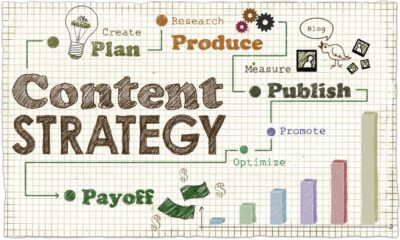

Business
Home Loan Repayment – Smart Tips & Loan Repayment Strategies
A home loan is one of the biggest financial commitments in an individual’s portfolio. Today, thanks to the availability of numerous home loan deals, dozens of lenders and HFCs, getting a home loan is easier than ever before. The biggest challenge here is repaying the home loan on time.
Paying off a home loan is a challenge – primarily due to the longer tenures. Unlike personal loans and bike loans, which are generally short-term, home loans have a longer-term ranging from 10 to 30 years. So, you have to ensure that you have a steady source of income to pay off the loan as per schedule.
With that said, you can save lakhs on home loan repayment. Yes, you read that right – it’s possible to cut down the repayment amount. Continue reading to find the best tips and strategies to save money while repaying your home loan. You can also get idea how money transfers work.
Tips to Save Money on Home Loan Repayment
Home loans are big-ticket, long-tenure loans. As a result, the interest repaid on a home loan is usually on the higher side. However, with proper planning and smart strategies, you can save money on home loan repayment.
#1: Do Your Homework
The critical step to reducing home loan outgo is to select the right loan offer. Leading banks and HFCs have steadily reduced home loan interest rates since the last quarter of 2020. While this helped in boosting home loan demand, it’s a huge benefit for home loan borrowers. Experts predict that low-interest rates are here to stay, despite the pandemic.
Several leading lenders like State Bank of India, ICICI Bank, HDFC Bank, Kotak Mahindra Bank, LIC Housing Finance, Axis Bank have reduced home loan interest rates in 2020 and even slashed them further in 2021. Currently, home loan rates start as low as 6.65%.
Top Home Loan Interest Rates for 2021
Here’s a quick comparison chart that lists out the current interest rates at leading lenders.
A home loan is one of the biggest financial commitments in an individual’s portfolio. Today, thanks to the availability of numerous home loan deals, dozens of lenders and HFCs, getting a home loan is easier than ever before. The biggest challenge here is repaying the home loan on time.
Paying off a home loan is a challenge – primarily due to the longer tenures. Unlike personal loans and bike loans, which are generally short-term, home loans have a longer-term ranging from 10 to 30 years. So, you have to ensure that you have a steady source of income to pay off the loan as per schedule.
With that said, you can save lakhs on home loan repayment. Yes, you read that right – it’s possible to cut down the repayment amount. Continue reading to find the best tips and strategies to save money while repaying your home loan.
Tips to Save Money on Home Loan Repayment
Home loans are big-ticket, long-tenure loans. As a result, the interest repaid on a home loan is usually on the higher side. However, with proper planning and smart strategies, you can save money on home loan repayment.
#1: Do Your Homework
The critical step to reducing home loan outgo is to select the right loan offer. Leading banks and HFCs have steadily reduced home loan interest rates since the last quarter of 2020. While this helped in boosting home loan demand, it’s a huge benefit for home loan borrowers. Experts predict that low-interest rates are here to stay, despite the pandemic.
Several leading lenders like State Bank of India, ICICI Bank, HDFC Bank, Kotak Mahindra Bank, LIC Housing Finance, Axis Bank have reduced home loan interest rates in 2020 and even slashed them further in 2021. Currently, home loan rates start as low as 6.65%.
- If you’re on the lookout for a new home loan, it makes sense to compare the interest rates offered by different lenders. Loan aggregator portals like CreditMantri make it easy to compare and evaluate interests provided by other lenders quickly. Compare and pick the lender who offers you the best deal.
- Make sure to consider the other factors besides the interest rates. Two banks may offer the same interest rate, but there might be differences in processing fee and additional charges. So, while evaluating lenders, make sure to consider all costs.
Not doing adequate research before applying for a home loan can cost you additional expenses that can be easily avoided.
#2: Save Before You Apply for a Home Loan
Home loan preparations should start long before you apply for one. Take some time (around six months to one year) saving for the down payment. Invest your money in short-term funds to pay for the down payment. The larger the down payment, the lower the loan amount and lesser the interest outgo. So, try to save a large down payment to save money on the interest payable.
#3: Negotiate with the Lender to Reduce Interest Rates
If you’re on a floating loan rate, then the interest rate on your home loan will be automatically changed as per market conditions. However, if you’re on a fixed loan rate, your repayment is set as per the initial interest rates.
However, you can still negotiate with the lender to adjust your ongoing interest rates. This is likely to work out if you have been a customer with the bank for a long time and maintain other investments with the bank.
Get in touch with your relationship manager at your bank to see if it’s possible to negotiate and reduce ongoing interest rates.
#4: Prepay your Loan
Prepaying an ongoing home loan ahead of schedule is a great way to reduce the total interest payable. However, prepaying a home loan is easier said than done. You have to maintain financial discipline, budget your finances, and plan accordingly to repay the outstanding loan amount in one go. Alternatively, you can also part-pay the balance to reduce the due loan amount and interest balance.
Before you prepay your home loan, make sure to calculate the prepayment charges and other fees to see if the savings are worth it.
#5: Go for a Home Loan Balance Transfer
A home loan balance transfer is the process of transferring an ongoing home loan from one bank to another. The main reason for a home loan balance transfer is to take advantage of the lower interest rates offered by the new lender. Balance transfer helps to cut down the interest amount significantly.
With the currently prevailing low home loan interest rates, it makes sense for existing home loan borrowers to switch their loans from a borrower with high rates to lenders offering lower interest rates. Contrary to popular misconception, a home loan balance transfer is not complicated and easy provided you have the proper documents and meet the eligibility conditions specified by the new borrower.
- Here’s an example. Let’s say a customer has taken a home loan for Rs. 30 lakhs at 8% for a tenure of 20 years. By switching his ongoing loan to a lender who offers an interest rate of 6.65%, he can easily save Rs. 2460 per month on his EMI. This translates to a savings of over Rs. 5.90 lakhs in 20 years.
- When you transfer a home loan, make sure not to reduce the EMI if you want to complete the loan quicker and save money.
- With steep drop-in home loan interest rates, it’s a good time to transfer your home loan, especially if you’re paying high-interest rates on your current loan.
- Home loan balance transfers are especially beneficial if you have a longer tenure remaining. For example, a customer who has an Rs. 50 lakh home loan can save Rs. 4100 per month on the EMI by switching from 8% interest to 6.65%. This translates to a total savings of Rs. 39.36 lakhs over the loan tenure.
Final Thoughts
Though repaying a home loan can be expensive, you can still save money by following the five aforementioned strategies. When it comes to saving money on your home loan, financial commitment is critical. Ensure that you repay EMIs on time. Also, keep in mind that you can always make part-payment on the outstanding loan to reduce the interest outgo. Use the strategies listed here to save money on your home loan repayment.
Business
Collaboration Chronicles: 5 Tips for Partnering with Other Businesses to Create Mutual Success

Partnering with other businesses can be a powerful strategy for growth. By leveraging complementary strengths and resources, both parties can achieve more together than they could alone. It can increase your reach and lead to shared success.
However, successful partnerships require careful planning, clear communication, and a commitment to mutual benefit. Although you can buy corporate gifts to express appreciation, that’s not the only way to strengthen relationships. Also, consider the five following tips:
- Identify Complementary Businesses
The first step is to look for businesses that offer products or services that complement yours without directly competing. This creates opportunities for cross-promotion, referrals, and bundled offerings that appeal to a broader customer base.
For example, a wedding planner could partner with a florist, photographer, and catering company to offer comprehensive packages. A strategic partnership like this can also help in reaching new audiences and expand your reach in the market.
- Define Mutual Goals and Expectations
Before entering into a partnership, make sure both parties have a clear understanding of the objectives, expectations, and desired outcomes. Establish measurable goals, such as increased sales, expanded reach, or improved customer satisfaction.
You’ll want to clearly define each partner’s responsibilities, timelines, and metrics for success so there’s no ambiguity about the end goal. And you should each know what to expect in terms of delivery to make that happen.
- Develop a Collaborative Marketing Plan
Create a joint marketing plan that leverages the strengths and audiences of both businesses. Collaborate closely to identify each company’s unique selling points, target demographics, and marketing channels.
Then, develop strategies that allow you to cross-promote and reach a wider audience by tapping into each other’s customer base. You can create co-branded content such as joint blog posts, videos, or social media campaigns that showcase how your offerings complement each other.
Consider package deals or discounted bundles where customers can purchase your combined products or services at a reduced rate. This incentivizes them to try out both offerings and experience the synergies firsthand.
- Foster Open Communication and Trust
Effective communication is essential for a successful partnership. Without open and consistent dialogue, misunderstandings and misaligned expectations can quickly derail even the most promising collaborations.
Schedule regular check-ins, whether weekly or monthly, to discuss progress toward shared goals. These meetings provide an opportunity to review metrics, address any concerns or roadblocks, and explore new opportunities that may have arisen.
During these check-ins, encourage transparency from both parties. Be open and honest about challenges, successes, and areas that may need adjustment. Maintaining transparency builds trust and allows you to address issues proactively before they escalate.
- Measure and Refine the Partnership
Establish a system for regularly tracking and reporting on key performance indicators (KPIs) that align with your shared objectives. This could include metrics such as sales figures, website traffic, customer acquisition rates, or customer satisfaction scores.
Gather data from various sources, including sales reports, website analytics, customer surveys, and financial statements. Analyze this data thoroughly to identify areas where the partnership is excelling or falling short.
This will help to keep you agile and open to change. As both businesses grow and evolve, the initial terms of the partnership may also need to be updated to maintain relevance and mutual benefit.
Establish Mutually Beneficial Partnerships
A strong partnership is built on clear communication, shared goals, and a commitment to creating a win-win situation for all parties involved. If you follow these tips, you’ll form a partnership that creates value for both businesses and their respective customers.
Business
Digital Fortresses: How Peniel Solutions Safeguards Valuable Data in the Cloud
Earlier when technology was far from being intervened, the safety of one’s assets was a lingering threat. Now diverse fields across the world have advanced greatly in numerous domains. Resources are less likely to be in possible danger of any kind of burglary or fraud. Since then, mankind has attained a maximum level of civilization. This progression has resulted in tremendous security checks on one’s hard-earned valuables, not to forget the law and order sustained in order to get justice for those individuals suffering from wrongful acts of theft.
However, the blessed progression in technology has also paved the way for unlawful acts of misconduct in terms of scams and embezzlement. The digital era being bountiful in modern times has also become the sole modem to one’s secret files and valuable data across the globe. This confidence in the virtual aspect paves a feasible path for notorious hackers to misuse treasured documents that can cause serious damage to one’s organization. The rise of serious concerns in the cybersecurity departments gave birth to noteworthy products like TransAccess GovCloud Records with its integrated user behavior utility (UBC) utility, developed by Peniel Solutions, LLC to help identify bad actors using our proven cybersecurity measures. TransAccess GovCloud Records which is the flagship software as a service (SaaS) solution developed by Peniel Solutions, LLC (PSL), was established in 2000 by early entrepreneurs James McGriff and Veronise J. Wright. The company was founded as a federal agency provider of outsourcing services with a focus on business process management. The goal of PSL is to make it easier for government agencies, its partners and businesses to share vital business information. The company’s top priority is innovation, with the goal of consistently creating new offerings within its current portfolio. Developing and acquiring new intellectual and technology assets is a key component of PSL’s growth strategy, which aims to increase client solutions and market penetration.
PSL is an expert in transforming business processes for the federal government through technology. The company offers a 24×7 support model thanks to well-honed processes and procedures; it also regularly exceeds quality standards, accelerates service delivery by 10%, and improves client ROI by 20% on average.
The 4 major services that the company is known to provide are as follows;
Online Safety
Peniel Solutions offers continuous cybersecurity protection against growing cyber threats directed toward government entities in the United States. By correcting vulnerabilities in real-time, they provide comprehensive cybersecurity services that thwart known as well as emerging threats. Additionally, the program offers vulnerability and risk assessments and covers:
Risk Management Framework; Continuous Monitoring; Hacking Detection; Security Architecture Review; Systems Security Engineering; Security Operations Center
TransAccess Record Management GovCloud Records
They specialize in removing adversities associated with the conventional paper-based process by providing a scalable document management system with adaptable solutions and a streamlined user experience. This service makes sure that all organizational documents are easily accessible without requiring the installation of any software.
Software Engineering Peniel Solutions
Utilizes scrum, agile, and DevOps approaches to provide ISO and CMMI Development-Certified software engineering solutions that prioritize quality in both traditional and mobile applications. Moreover, it covers end-to-end AI/ML DevSecOps strategies which are the ultimate solution for agencies and businesses that want to secure and streamline their software development process. PSL offers a comprehensive suite of features including static analysis of infrastructure-as-code, unsupervised anomaly detection on events, natural language query of documentation, automated red team attacks, predictive threat modeling, and self-healing and response. These cutting-edge features are designed to give agencies and businesses the confidence and peace of mind they need to reach their full potential.
Cloud Solution
PSL helps clients with DevOps, cloud application migration, and application management by leveraging AWS’s GovCloud and its partner status.
PSL possessing more than 20 years of experience and a CMMI Level 3 accreditation, is an established Service-Disabled Veteran-Owned Small Business (SDVOSB). As a GSA-approved supplier with expertise in Electronic Records Management Solutions (ERMS), PSL guarantees adherence to OMB and NARA’s M-23-7 requirements. Additionally, PSL has strengthened data management and compliance by successfully implementing an ERMS for the FHA’s Department of Urban Development. Furthermore, with the Highly Adaptive Cybersecurity Services (HACS) certification from the GSA, PSL offers security solutions to protect federal data.
Business
5 Ways to Ensure Security of Financial Transactions in Your Business


In the present computerized age, where financial transactions happen at lightning speed and across different stages, guaranteeing the security of these exchanges is vital for organizations. With the consistent danger of cyberattacks and deceitful exercises, protecting your financial transactions is not simply a question of consistence yet additionally critical for keeping up with the trust of your clients and partners. From executing vigorous encryption conventions to instructing your staff about likely dangers, there are a few proactive measures you can take to reinforce the security of your financial transactions.
Safeguarding Data Integrity and Confidentiality:
One of the fundamental mainstays of guaranteeing the security of financial transactions lies in implementing robust encryption protocols. Encryption includes encoding delicate information communicated between parties, delivering it incomprehensible to unauthorized entities. By encoding monetary data, for example, credit card details, personal identification numbers (PINs), and transactional data, organizations can forestall capture by malignant actors and keep up with the respectability and secrecy of their clients’ data. Businesses can also enhance their financial processes by integrating robust security measures, including the adoption of free invoice software, to ensure the secure and confidential transmission of sensitive billing information. By coordinating encryption conventions into your financial infrastructure, you make a vigorous boundary against unapproved access and information breaks.
Strengthening Access Controls and Identity Verification:
In a time portrayed by heightening digital dangers and modern hacking methods, depending entirely on passwords for validation presents critical security risks. Multifaceted confirmation (MFA) offers an extra layer of guard by expecting clients to check their personalities through numerous means, thereby mitigating the likelihood of unauthorized access to sensitive financial systems and accounts. MFA regularly consolidates at least two verification factors, for example, something the client knows (e.g., a secret word), something they have (e.g., a cell phone or token), or something they are (e.g., biometric identifiers like unique finger impression or facial acknowledgment).
Regular Security Audits and Vulnerability Assessments:
A proactive approach that conducts routine audits and vulnerability assessments to find possible flaws and vulnerabilities in your financial systems and procedures is necessary for successful security management. By overseeing thorough security evaluations, you may assess the efficacy of present security measures, ascertain if they adhere to industry norms and standards, and spot any variations or inconsistencies that can indicate potential security breaches. By employing advanced methods and automated tools, such vulnerability scanning and penetration testing, you may imitate real-world attack scenarios and identify vulnerabilities before malicious actors do so.
Secure Payment Gateways and Fraud Detection Mechanisms:
The proliferation of e-commerce and digital payment platforms has revolutionized the way businesses conduct financial transactions, offering unparalleled convenience and accessibility to consumers worldwide. Notwithstanding, with the rising commonness of online fraud and installment related tricks, securing payment gateways and implementing robust fraud detection mechanisms is imperative for safeguarding the integrity of financial transactions. Secure installment passages utilize industry-standard encryption conventions and tokenization procedures to scramble delicate installment data and work with secure transmission among shippers and installment processors. By partnering with reputable payment service providers (PSPs) and adhering to PCI DSS (Payment Card Industry Data Security Standard) compliance requirements, businesses can minimize the risk of payment card data theft and unauthorized transactions.
Employee Training and Awareness Programs:
While mechanical arrangements assume an urgent part in strengthening the security of monetary exchanges, the human component remains similarly basic in moderating insider dangers and social designing assaults. Instructing your representatives about network safety best practices and encouraging a culture of safety mindfulness are fundamental parts of a far reaching security procedure. By enabling your labor force with the information and abilities to distinguish and answer potential security dangers, you make an aggregate protection instrument that reinforces the versatility of your association’s security act.
All in all, guaranteeing the security of monetary exchanges is a continuous cycle that requires a multi-layered approach encompassing technological solutions, proactive risk management strategies, and a culture of security awareness. By executing strong encryption conventions, multifaceted confirmation tools, and secure installment entryways, organizations can brace their monetary foundation against digital dangers and shield the trustworthiness of exchanges. By focusing on security and putting resources into thorough safety efforts, organizations can impart trust in their clients and partners, guaranteeing the drawn out reasonability and progress of their activities in an undeniably interconnected world.

 Business3 years ago
Business3 years agoFind out how useful a loan is without a credit check

 Business1 year ago
Business1 year agoBest Workplace Upgrade

 Digital Marketing3 years ago
Digital Marketing3 years agoIs YouTube Marketing Capable of Taking Your Business to the Next Level?

 Food2 years ago
Food2 years ago5 Best and Worst Foods for Boosting Metabolism

 Business2 years ago
Business2 years agoContent Creation Tips Every Digital Manager Needs to Know

 Travel3 years ago
Travel3 years agoA Quick Traveler’s Guide to Malaga – You Can’t-Miss

 Lifestyle2 years ago
Lifestyle2 years agoHow to Choose the Best Air Fryer for Me

 Fashion2 years ago
Fashion2 years ago8 Top Leather Jacket Picks To Try Out This Year















